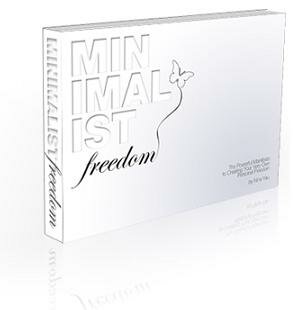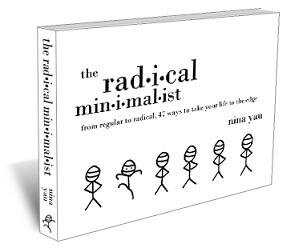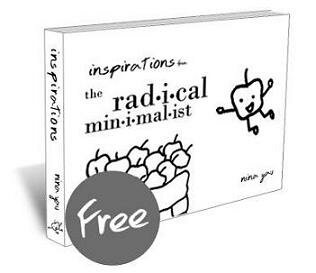Awareness: The Most Precious Kind of Freedom

Editor’s Note: Joshua Millburn & Ryan Nicodemus from theminimalists.com are two really, really tall guys. How do I know? I felt like a small squirrel standing next to them while chatting at the Chicago Tweetup a few weeks back.
But seriously, besides being tall, they are extremely nice and engaging and has worked hard to put together the series called Conscious Freedom, with this being the 3rd and final installment. Check out the first installment on Joshua Becker’s Becoming Minimalist and the second installment on Colin Wright’s Exile Lifestyle.
Freedom is a HUGE thing for me. And I suspect it may be for you too. So, with that, shall we?
**
Conscious Freedom: Part Three
The so-called real world of men and money and power hums merrily along in a pool of fear and anger and frustration and craving and worship of self. Our own present culture has harnessed these forces in ways that have yielded extraordinary wealth and comfort and personal freedom. The freedom all to be lords of our tiny skull-sized kingdoms, alone at the center of all creation. This kind of freedom has much to recommend it. But of course there are all different kinds of freedom, and the kind that is most precious you will not hear much talk about much in the great outside world of wanting and achieving. The really important kind of freedom involves attention and awareness. — David Foster Wallace, 2005, This Is Water
Dave’s Parable
In the above quoted essay—which was also an outstanding commencement speech given to Kenyon College’s graduating class of 2005—David Foster Wallace begins with a cute little story about two little fish who are swimming along and they happen to meet an older fish swimming the other way, and the older fish nods at them and says, “Morning, boys. How’s the water?” And the two young fish swim on for a bit, and then eventually one of them looks over at the other and says, “What the hell is water?”
Obviously, the point of Wallace’s little parable is obvious: the things that should be the most obvious to us are often not that obvious at all. Confused yet? Well, in other words, we get so caught up and immersed in our day to day activities that we don’t always notice what’s going on around us. Or worse, we don’t notice what’s going on inside us, inside our heads, inside our hearts. In the case of the two young fish, they were unaware of their most obvious surrounding. They were unaware of the water that surrounded them, it was something that was everywhere, something that was so important and so essential for their survival, and yet they were unaware that it even existed.
What Is Your Water?
But how does this apply to our lives? Surely we’re all bright enough to know which things are essential to our survival, right? And certainly we’re all bright enough to know that we need air to breathe and food to eat, just like the fish needed water to live, right?
But perhaps our proverbial water is much deeper and perhaps it’s much more complex. But perhaps it’s also just as obvious as the water should have been to the tiny little fish.
Maybe our water includes complex concepts like happiness and fulfillment and freedom. And while all of these things are ostensibly abstract and abstruse, perhaps they are more obvious than we realize, and perhaps they are essential to us. Perhaps we need freedom like the fish needed water.
What is Freedom?
Freedom is a vast, complex concept, and it is difficult to define or explain or dissect. Freedom means different things to different people, and it takes on different meanings within different contexts. Perhaps that’s why it took Jonathan Franzen twelve years and nearly six hundred pages to explain “Freedom” in his novel with the same title.
What’s even more complicated is that freedom is even harder to talk about as an event, and thus must be talked about as an abstraction, and that might be why Franzen had to write about it using stories and characters and a forty year narrative, so that he could compare and contrast freedom with ideas like loneliness, love, desire, pain and solitude, none of which explain freedom, but perhaps together they begin to explain the essence of freedom.
A Certain Kind of Freedom
Like we said, it’s very complicated. And that’s why this essay is not about freedom as a general term (which could possibly take a circuitous 500 page college thesis that very few of you would want to read). Rather, this essay is about a certain kind of freedom: awareness. More specifically, it’s about a certain kind of conscious acute awareness, an awareness of what’s going on around you, an awareness of what’s going on inside you.
This kind of awareness—one in which you must constantly be attentive—is the most precious kind of freedom. It is, in many respects, the choice between life and death, it’s the difference between living a meaningful life and being dead inside.
We realize that this kind of topic might sound like a lecture from a grandparent, and it’s easy to dismiss it as a bunch of esoteric nonsense because it makes us feel better to not think about such things, it makes us feel better to live our day to day lives unaware. But this kind of unconscious living does not make us free, it makes is a slave to the world around us, reacting to our own impulses without thinking.
The Minimalist’s Awareness
This is yet another reason why minimalism is so appealing to so many people. It removes many of the obstructions and allows us to focus on what’s important. Minimalism is a tool to rid ourselves of superfluous excess in favor of a meaningful life, it is a tool to take a seemingly intricate and convoluted world, cluttered with its endless embellishments, and make it simpler, easier, realer.
It is unimaginably hard to remain conscious and attentive and aware. It is difficult not to fall back into a trance-like state, surrounded by the trappings and obstructions of the tiring world around us. But it is important to do so. It is important to remind yourself that this is your life, to remind yourself that your life is important, to remind yourself that you can make a difference, to remind yourself that you have a purpose on this earth, one that extends beyond yourself. It is important to remind yourself that this is water.
**
Joshua Millburn & Ryan Nicodemus created theminimalists.com where they documented their journey into minimalism and they donate their time to help other people become minimalists.
**
Conscious Freedom Blog Series
Part 1: Everybody Worships Something (featured on Becoming Minimalist)
Part 2: I Am Not the Center of the Universe (featured on Exile Lifestyle)
Part 3: Awareness: The Most Precious Kind of Freedom (featured on Castles in the Air)

 My name is Nina Yau, author of
My name is Nina Yau, author of 







